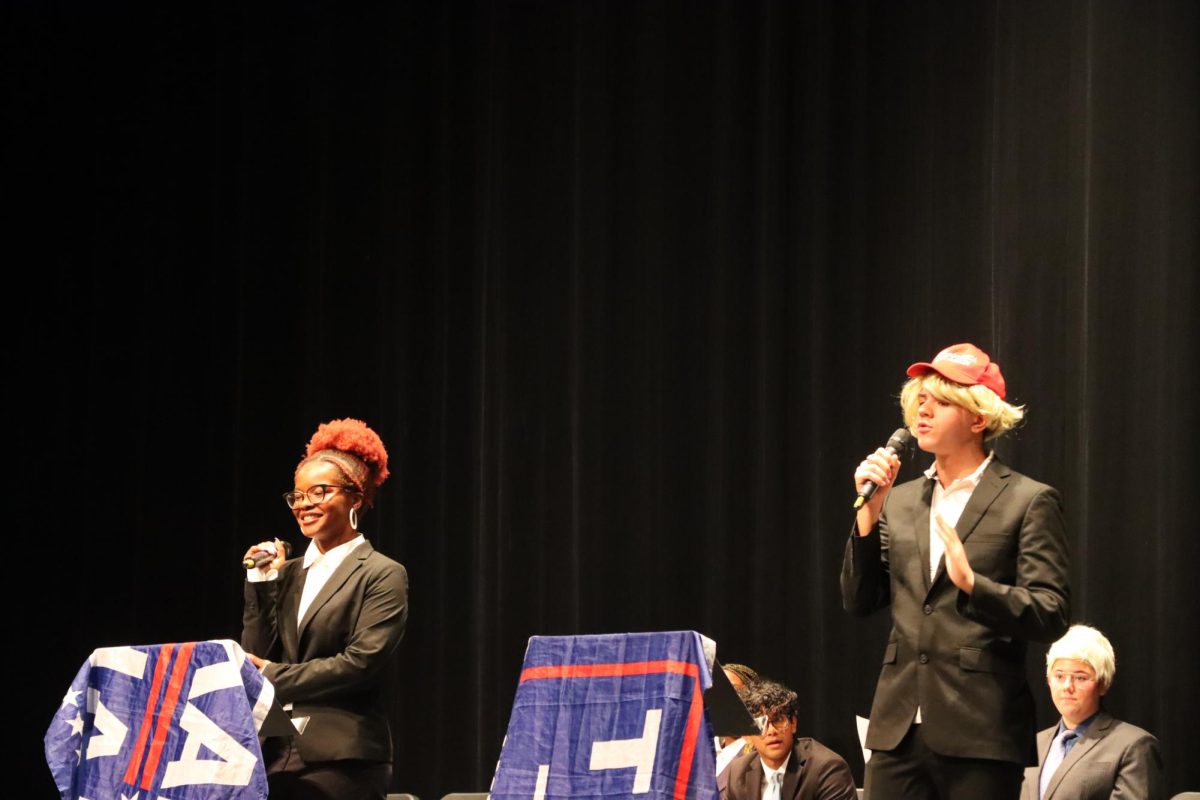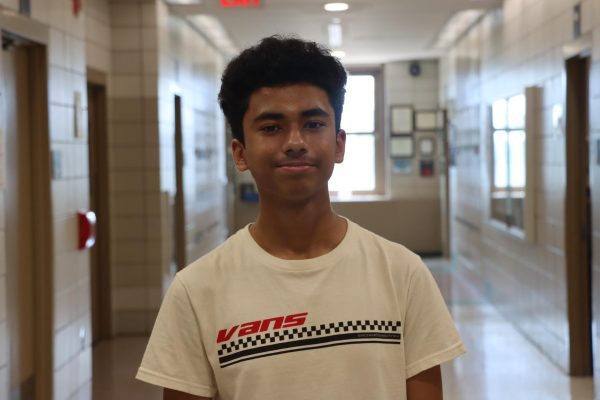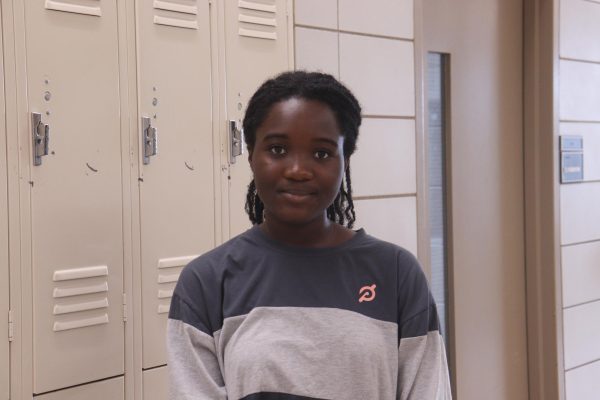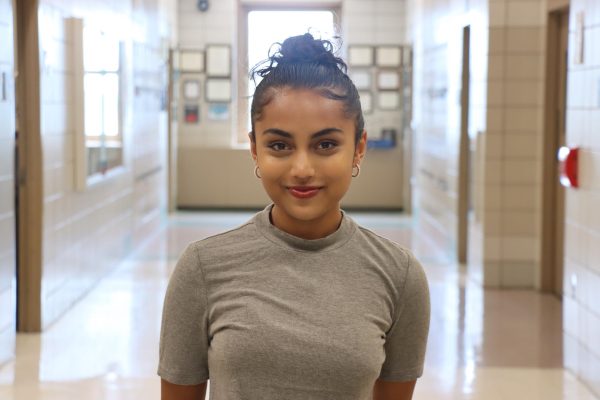
Following a month of campaigning from seniors performing as various candidates and members of political action committee (PAC) special interest groups, this year’s Election Simulation concluded as registered students cast their ballot just a day before the actual 2024 presidential election.
If the election were just being held in the world of the Townsend Harris Election Simulation, the president-elect would now be Kamala Harris, played by senior Tristin Hall. Both Tristin and senior Vivien Oksenhendler, who played Vice Presidential candidate Tim Walz, were victorious in their respective campaigns, winning the most contested races of the event (in the Simulation, students vote separately for president and vice president).
The Election Simulation intends to educate the student body about real United States election cycles and candidates. Each week of the Simulation was dedicated to certain policy categories for candidates to campaign on (in social studies classes, during lunch periods, after school, and on social media) while representing their real-life counterparts to the best of their ability.
AP Government teacher and dean Charlene Levi said, “The Simulation can serve as a hands-on introduction to political concepts, potentially sparking interest in civic matters [in] underclassmen.” She said it also aims to help “new students to build a foundational understanding of the electoral process, which may encourage informed participation in future real-life elections.”
Tristin, who represented Vice President and Democratic Presidential Candidate Kamala Harris, gave a personal account of her experience acting as Harris, saying, “It boosted my energy and morale to be in the Election Sim because this is a figure that I do advocate for… on specific issues [in real life]. I was very fortunate to [be able to portray a candidate whose views] aligned with my political beliefs because it would be hard to try to mask my own ideals and campaign on ideas I personally disagree with.”
While the Simulation was an exciting experience for many, it also came with its own set of challenges. Senior Madison Donenfeld, a member of Donald Trump’s Presidential simulated campaign committee said, “It was a bit difficult for me to try to pose as something I am [not], and pretend I supported a candidate I do not in the real world.” Madison also noted the struggle that comes with time management for the seniors, saying, “The time commitment is very significant. It feels a bit like a job and is very stressful.”
Madison’s team decided to take a different approach to the Election Simulation because of this, as they focused less on the candidate’s policies and more on their candidate’s public persona and attitude.
“For my rendition, I tried to portray more of [Trump’s] character while stating [his] policies,” said senior Xavier Murphy, who played Donald Trump, adding that he thinks that this approach made his portrayal more enjoyable.
Madison said, “Throughout the campaign, we have been attempting to partially steer away from being offensive and tried to go more into a crazy persona than seriously depict Trump. We knew it was complicated to portray Trump’s frequently racist, misogynist, and anti-Immigrant rhetoric, especially at such a diverse school, therefore we went the route of making him a bit more like a joke than an 100% accurate portrayal.”
Similarly, Senior Ava Jack, who portrayed Ohio Senate candidate Bernie Moreno said, “You still want people to believe in your beliefs even when you don’t necessarily align with them.” Students learned to adapt and fit the roles of the candidates they were representing.
Each student candidate had their own takeaways from the campaign. Senior Nicole Wikiera, representing U.S representative Alexandria Ocasio Cortez said, “Some positives are being able to teach underclassmen about the election.”
For some, the experience of campaigning allowed them to develop new skills. Senior Amala Madubuko, who played the role of democratic New York District 6 Representative Grace Meng, said, “I liked the idea of emulating a candidate’s public speaking and debate. I felt that these skills developed here would somehow help me in the future.”
Right before the election, candidates participated in a debate held in the THHS auditorium where candidates faced off with their opponents on key issues.
Though the debate can be nerve wracking, it gives participants an opportunity to grow and increase their public speaking skills. Ms. Levi said, “Role-playing can help newer students gain confidence in [their] public speaking and in expressing opinions, so they are allowed to start up PACs and participate in a grander way. “
Tristin mentioned one of the main difficulties being engaging the audience and ensuring they stayed entertained, saying, “I had to make sure I remembered to have energy and get the crowd involved with what I’m saying. […] Likability plays a major factor on who people vote for.”
Adding on to this, sophomore Valentina Martinez said, “Personally, I ended up voting for the nominees with the most enthusiasm and information they brought during their presentations and speeches. However, I believe most just based their vote off of solely the popularity of the candidate rather than their policies or informative speeches.”
Students shared that they were not only able to gain valuable insight into politics, but were also able to learn how to work efficiently with one another. Reflecting on the collaborative aspect of the Simulation, Ava said, “The workload was pretty heavy, but my campaign was constantly there to support me.”
Another aspect of the Election Simulation is that freshman votes count the most (each freshman vote counts twice) whereas senior votes are only worth half of one vote (to simulate Electoral College weighting, making underclassmen similar to “swing states”).
Freshman Siddhini Singh provided her opinion after experiencing THHS’s Election Simulation for the first time, highlighting the importance of introducing politics to young people. She said, “I thought the Election Sim was really fun, and it was a nice way to open politics to a lot of people. I gained a lot of knowledge on how specifically elections are run and regulated, and it was done in a friendly and interesting way.”
Siddhini shared that she voted for the simulation’s candidates based on her real-world political beliefs and said, “I think others should do the same. After all, the real life counterparts to those who are acting as the candidates are actually going head to head for winning the election.”
After experiencing his fourth Election Simulation at THHS, senior Borreno Shafi outlined how the Simulation has changed over the years in terms, with students relying heavily on social media rather than just in person campaigning to get their message out. He said, “[The] use of media trends and humor have been updated over the years to align with what is currently popular with students, which seems to be working great with students on social media.”
Freshman Maryam Ansari said, “I wouldn’t say the Election Simulation changed how I think about real elections, but it did give me [a bit of] insight and helped me learn to research candidates and their policies to make an informed decision when the time to vote actually comes.”
Here are the full results of this year’s winning campaigns:
- President: Kamala Harris (D)
- Vice President: Tim Walz (D)
- Pennsylvania Senate: Dave McCormick (R)
- Ohio Senate: Sherrod Brown (D)
- North Carolina District 01 Representative: Don Davis Jr. (D)
- Oregon District 5 Representative: Janelle Bynum (D)
- New York District 6 Representative: Grace Meng (D)
- New York District 14 Representative: Tina Forte (R)
































Angela Ahramo • Nov 13, 2024 at 10:44 am
Do you know much people are struggling paying their bills feeding their family. It amazing if you don’t agree with democrats you are called a racist . When you ask Harris a question she says let me get back to you. Where was she the last four years